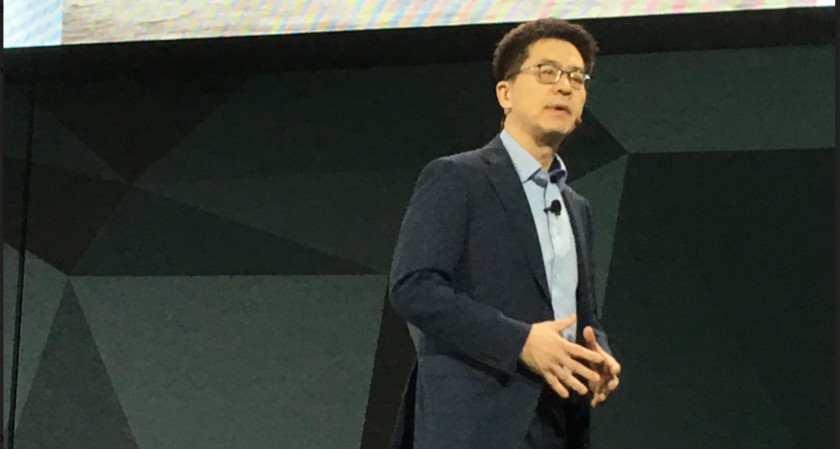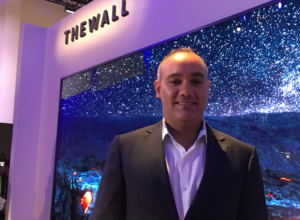M+E Connections

CES 2018: AI Touted Heavily by LG, Samsung, Byton on Eve of CES
Story Highlights
LAS VEGAS — Artificial intelligence (AI) played a key role in the news briefings held by LG, Samsung and startup Byton on the eve of the Consumer Electronics Show here as the three companies touted the technology’s use in a wide range of products, including TVs, appliances, robots and even smart electric vehicles.
At its Jan. 8 news briefing, LG unveiled nine new 4K OLED TV models ranging in size from 55 to 77 inches and seven new 4K LED-backlit LCD TVs ranging in size from 55 to 75 inches that all feature the company’s new LG ThinQ AI technology.
ThinQ — the same name previously given to LG’s smart hub — enables the “implementation of hundreds of voice requests utilizing webOS,” LG’s open smart platform, as well as third-party AI services, the company said in its news release. ThinQ combines the webOS smart TV platform with integrated Google Assistant and deep learning technology to “create an AI capability that uses voice commands to control TV functions, search for content over-the-air or on various streaming partners, or control other connected” Internet of Things (IoT) devices in the network, LG said. LG’s full 2018 4K UHD TV lineup is equipped with the 2018 ThinQ AI, making them a seamless addition to any connected home.
The new LG TVS also all feature 4K Cinema HDR, which it said enables the support of all major High Dynamic Range (HDR) formats, including Dolby Vision, newly added Advanced HDR by Technicolor, Hybrid Log Gamma (HLG) and HDR10, as well as enhanced processing with HLG Pro and HDR 10 Pro. The new TVs also process HDR images dynamically frame by frame using LG’s proprietary algorithm, Enhanced Dynamic Tone mapping, it said.
LG is implementing ThinQ AI in not just TVs, but a “diverse portfolio of everyday products,” including air conditioners, washing machines, refrigerators and other appliances, as well as wireless speakers (as part of a collaboration with Google) and “intelligent” headphones, LG Electronics CTO I.P. Park said during the news briefing.
ThinQ is also incorporated into LG’s new robot devices that include the CLOi smart hub, David VanderWaal, VP of marketing for home appliances and consumer electronics (CE) at LG Electronics USA, showed reporters. Initially, his demonstration of how CLOi can help users control other smart devices throughout the house went without a hitch, but CLOi stopped communicating with him part-way through the demo.
The AI-powered LG devices all use its new DeepThinQ engine and the new platform will “enhance efforts to speed up the release of new products equipped with the latest technology across LG’s business units,” the company said in a separate news release. DeepThinQ 1.0 was developed last year with the establishment of LG’s AI Lab in Korea to accelerate research into AI, it said. DeepThinQ 1.0 AI functions include voice, video and sensor recognition, as well as spatial recognition and human body detection, that LG said are all “developed and refined through analysis of LG user habits over time.”
Devices developed on the DeepThinQ platform “will become smarter over time through the utilization of cloud servers,” it added. That learning feature is “at the heart of DeepThinQ, enabling LG AI products to understand not only their external environments but also the behavioral patterns of their customers,” it said, noting ThinQ air conditioners, for example, “have the ability to learn and analyze customer living patterns over time, thereby understanding and automatically cooling a room to the temperature preferred by the occupant.”
In a vehicle, LG’s cabin monitoring technology learns the driver’s facial expressions and gestures and will recognize the moment in which a driver becomes sleepy, it said, adding: “Eventually, ThinQ will be able to automatically adjust the music, lighting or climate inside the car by learning about the passengers who most often occupy the car.”
Samsung
At what has become an annual “First Look” event for reporters the evening before the main CES news conferences, Samsung on Jan. 7 introduced an 85-inch Ultra High-Def (UHD) TV that the company said can upscale any content to 8K using AI. The QLED TV model features AI upscaling technology that “upscales standard definition content to 8K by employing a proprietary algorithm to adjust screen resolution based on the image quality characteristics of each scene,” Samsung said in its news release.
 The new TV can also play native 8K content and upscale HD or 4K to 8K, Dave Das, SVP of CE at Samsung Electronics America, told the Media & Entertainment Services Alliance (MESA) after his presentation. Specifics including pricing and the ship date weren’t provided yet.
The new TV can also play native 8K content and upscale HD or 4K to 8K, Dave Das, SVP of CE at Samsung Electronics America, told the Media & Entertainment Services Alliance (MESA) after his presentation. Specifics including pricing and the ship date weren’t provided yet.
Samsung also used the First Look event to introduce “The Wall,” its first consumer modular MicroLED TV. The company didn’t say when that humongous, 146-inch model with self-emitting LED bulbs will ship or how much it will cost. The technology replaces color filters with micrometer scale LEDs that are much smaller than current LEDs and serve as their own source of light, Samsung said.
Because of its module-based, bezel-less design, “The Wall” enables consumers to customize their TVs to the size and shape of their choice, it said, noting the modular screen can be used to create a wall-sized display, or just let users increase their traditional screen size to suit a new room in their home. Samsung also integrated its Bixby intelligent assistant platform into its new TVs, it said.
Byton
Earlier on Jan. 7, at the first news conference of the day, Byton introduced its first drivable concept car — an electric, intelligent SUV that company executives said functions as a next-generation smart device. It will feature Amazon Alexa for intelligent voice control, facial recognition cameras and multiple screens including a massive, 49” x 9.8” Shared Experience Display that replaces the traditional central console of most cars. (Driving safety activists may have a field day over the latter feature.)
The vehicle will be manufactured at the company’s Nanjing, China, plant and start at a whopping $45,000 when it ships in China in late 2019 and the U.S. and Europe in 2020, the company said.









